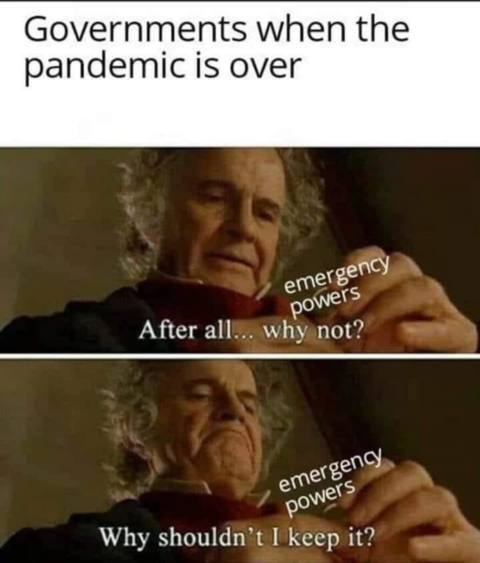Charles Eisenstein on the ongoing relationship between the citizens of most western countries and their governments:
The relationship between our governing authorities and the public today bears many similarities to the abuser-victim dynamic. Facing a bully, it is futile to hope that the bully will relent if you don’t resist. Acquiescence invites further humiliation. Similarly, it is wishful thinking to hope that the authorities will simply hand back the powers they have seized over the course of the pandemic. Indeed, if our rights and freedoms exist only by the whim of those authorities, conditional on their decision to grant them, then they are not rights and freedoms at all, but only privileges. By its nature, freedom is not something one can beg for; the posture of begging already grants the power relations of subjugation. The victim can beg the bully to relent, and maybe he will — temporarily — satisfied that the relation of dominance has been affirmed. The victim is still not free of the bully.
That is why I feel impatient when someone speaks of “When the pandemic is over” or “When we are able to travel again” or “When we are able to have festivals again.” None of these things will happen by themselves. Compared to past pandemics, Covid is more a social-political phenomenon than it is an actual deadly disease. Yes, people are dying, but even assuming that everyone in the official numbers died “of” and not “with” Covid, casualties number one-third to one-ninth those of the 1918 flu; per-capita it is one-twelfth to one-thirty-sixth. As a sociopolitical phenomenon, there is no guaranteed end to it. Nature will not end it, at any rate; it will end only through the agreement of human beings that it has ended. This has become abundantly clear with the Omicron Variant. Political leaders, public health officials, and the media are whipping up fear and reinstituting policies that would have been unthinkable a few years ago for a disease that, at the present writing, has killed one person globally. So, we cannot speak of the pandemic ever being over unless we the people declare it to be over.
Of course, I could be wrong here. Perhaps Omicron is, as World Medical Association chairman Frank Ulrich Montgomery has warned, as dangerous as Ebola. Regardless, the question remains: will we allow ourselves to be held forever hostage to the possibility of an epidemic disease? That possibility will never disappear.
Another thing I’ve been hearing a lot of recently is that “Covid tyranny is bound to end soon, because people just aren’t going to stand for it much longer.” It would be more accurate to say, “Covid tyranny will continue until people no longer stand for it.” That brings up the question, “Am I standing for it?” Or am I waiting for other people to end it for me, so that I don’t have to? In other words, am I waiting for the rescuer, so that I needn’t take the risk of standing up to the bully?
If you do put up with it, waiting for others to resist instead, then you affirm a general principle of “waiting for others to do it.” Having affirmed that principle, the forlorn hope that others will resist rings hollow. Why should I believe others will do what I’m unwilling to do? That is why pronouncements about the inevitability of a return to normalcy, though they seem hopeful, carry an aura of delusion and despair.
In fact, there is no obvious limit to what people will put up with, just as there is no limit to what an abusive power will do to them.
H/T to Perry de Havilland for the link.




